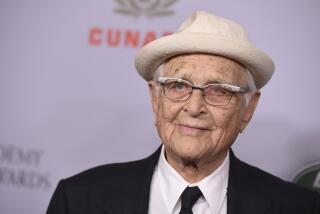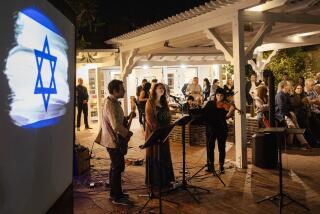A 9/11 street teacher at the scene of the crime
Reporting from New York — The passengers from New Jersey spill out of the train station and across the blistering sidewalks of Lower Manhattan, oblivious to one another as they steamroll toward their destinations.
One rider stands out from the pack: a broad-shouldered man wearing jeans, T-shirt and a baseball cap, a tattered gym bag slung over one shoulder. He takes in the scene outside the station, at the edge of the former World Trade Center, and homes in on a young couple.
“Do you know the past? That’s the question I ask!” he barks cheerfully at the pair, who have no time to respond before he fires off his next question.
“Where are you from?”
“Uh, L.A.,” the man says slowly, clearly trying to decide whether this sweaty interloper — Harry John Roland — is nuts or nice, a tour guide or a bum, but also drawn in by his wide grin and giddy demeanor.
Roland follows up with the same obscure detail he shares with everyone he meets on these streets: the exact time it was in their hometown when that first plane hit the World Trade Center on Sept. 11, 2001.
In Los Angeles, it was 5:46 a.m.
The couple listen and nod as Roland begins reciting the history of the fallen buildings. They sidle away after about 30 seconds, but Roland isn’t fazed. He moves on and keeps on talking — bellowing actually — a singsong phrase that is nearly as familiar in this neighborhood as the clangs and drones of heavy machinery inside the construction zone known as ground zero.
“History, don’t let it be a mystery!” Roland shouts to nobody in particular. “How many buildings were there before they were gone? Don’t get it wrong! Don’t say two, ‘cuz that’s not true!”
In the 10 years since 9/11, the site has become a magnet for tourists and for entrepreneurs hawking postcards of the twin towers, books of photos from the day of the attacks, and key chains with American flags.
For Roland, it has become an obsession and a public stage. He is a tour guide of sorts who works for nobody but himself and is paid in tips stuffed into a plastic jug that hangs from a strap around his neck. He’s known as “the World Trade Center man.”
Every day, he appears outside the disaster site to talk about what happened to the buildings and the people inside them, to lovingly wipe down the plaques honoring fallen firefighters, and to badger tourists into asking him questions and listening to his hypnotic spiel.
“Don’t be scared — say something!” he belted out to a family who stared back, wide-eyed and silent, when Roland challenged them to recall how many planes were hijacked that day. The answer is four. But a decade after the fact, memories are fading, laments Roland, who says he is driven by a preoccupation with the towers and a determination to make people — particularly Americans — learn from history and cherish what they have.
“America is appreciated only when you leave it,” said Roland after greeting some tourists from Israel.
“I don’t have to tell you about terrorism,” he told them. “Americans have no idea.”
Although he shouts, “History, don’t let it be a mystery,” more than 100 times a day, Roland’s own history is a mystery. This much is clear: He grew up in Harlem, is 57, lives in Jersey City, N.J., and has a 15-year-old son. He says he became a history buff while growing up under the guidance of a strict uncle “who kind of carried the baseball bat in the family.”
While other young black men he knew fell victim to drugs and crime, Roland says he learned about history and engineering, though it’s unclear whether he ever worked at either. Asked whether he ever lived overseas, Roland says cryptically, “I’m not allowed to say.” He gives a similar answer when asked whether he served in the military.
“I wish I knew more about him,” said Robert Maxwell of North Carolina, who met Roland when he and his wife visited the World Trade Center site after the 2001 attacks. They were captivated by Roland’s mix of street theater and history lectures and have stayed in touch. Maxwell described Roland as a “troubled soul,” driven by something that only he understands.
“He’s just got this thing pushing him,” Maxwell said. “He doesn’t seem to have a political agenda. He just knows everything about the towers.”
Roland has his critics, who accuse him of lying about his connection to the terrorist attacks to impress tourists. For instance, Roland says he lost a nephew who worked in the south tower, which was the first to collapse. But Roland has given two different names for the nephew. One does not appear on the official list of victims; the other is of a white man who lived in San Diego. The photographs Roland shows of the nephew are of a black man.
Pressed on the question of the nephew, Roland responds with a theory that hundreds or even thousands of people died that day who never were officially counted. “What about the homeless? What about the undocumented workers?” he asked.
“All the names are not on the list,” he insisted to Wil Willenborg and her daughters, Marthe and Geertje Van Engen, who were visiting from the Netherlands and found themselves pulled into Roland’s orbit on a warm August afternoon.
“He speaks with his heart,” said Willenborg as the trio struggled to explain the man’s ability to draw strangers close and keep them there.
“He’s fascinated by the history, but it’s more than that. He’s fascinated by everything, and he brings this to others,” said Geertje as her sister stuffed a $20 bill into Roland’s jug.
“I get emotional listening to him,” Marthe said.
Though there’s no evidence for his claim of overlooked victims, Roland has no trouble captivating an audience as he alludes to these mysterious lost souls from the corner of Liberty and Greenwich streets, outside a fire house about 30 feet from the main entrance to the construction zone.
“How many buildings were there before they were gone?” he shouts, before launching into a chorus that he repeats in various forms throughout the day:
“I look for those who have no idea what was here;
“I look for those to know the facts;
“I look for those to know the truth;
“I look for those to understand that 9/11 changed the whole world.
“Wake up, please!
“Don’t say two, ‘cuz that’s not true.
“You don’t know? Ask somebody, please.
“History, don’t let it be a mystery.”
When he’s not speaking to passersby, Roland uses a small cloth to buff the 56-foot-long bronze memorial wall facing Greenwich Street that pays tribute to the 343 firefighters who died in the attacks.
Whatever his embellishments and conspiracy theories, Roland clearly has fans here. Cries of “Don’t say two!” arise from construction workers, cops and other regulars when he walks past.
On a recent weekday afternoon, a burly iron worker leaving his shift at the construction site was among those stuffing bills into Roland’s jug. “This is Harry History, listen to him!” another worker yelled.
Roland says he began coming here a few weeks after the Sept. 11 attacks. He was listening to the radio one day when he heard someone say that just two buildings — the iconic twin towers — had been destroyed. Roland was determined that the five other World Trade Center buildings ruined by the attacks — and the people who were inside them — not be forgotten, so he began making the trip to Lower Manhattan from his home across the Hudson River every day and speaking to anyone who would listen.
With his rhythmic, upbeat delivery and booming voice, he quickly drew crowds. His jug began filling up. Once, a man pushed a Canadian $100 bill into it, but most people donate $1 or $2. Roland says he doesn’t care if they donate anything, and he often begins talking before he has pulled his money jug out of his bag and hung it around his neck.
Sometimes, he walks over to Broadway and slips into a Staples store, where he make photocopies of a 2007 article about him that appeared in an online magazine. He pastes the copies onto lampposts as he heads back to his corner, belting out World Trade Center trivia along the way.
More to Read
Sign up for Essential California
The most important California stories and recommendations in your inbox every morning.
You may occasionally receive promotional content from the Los Angeles Times.











